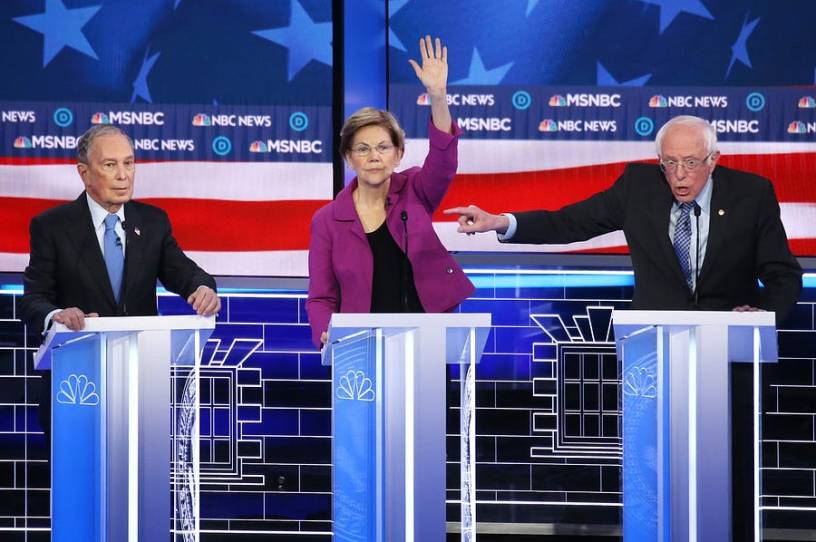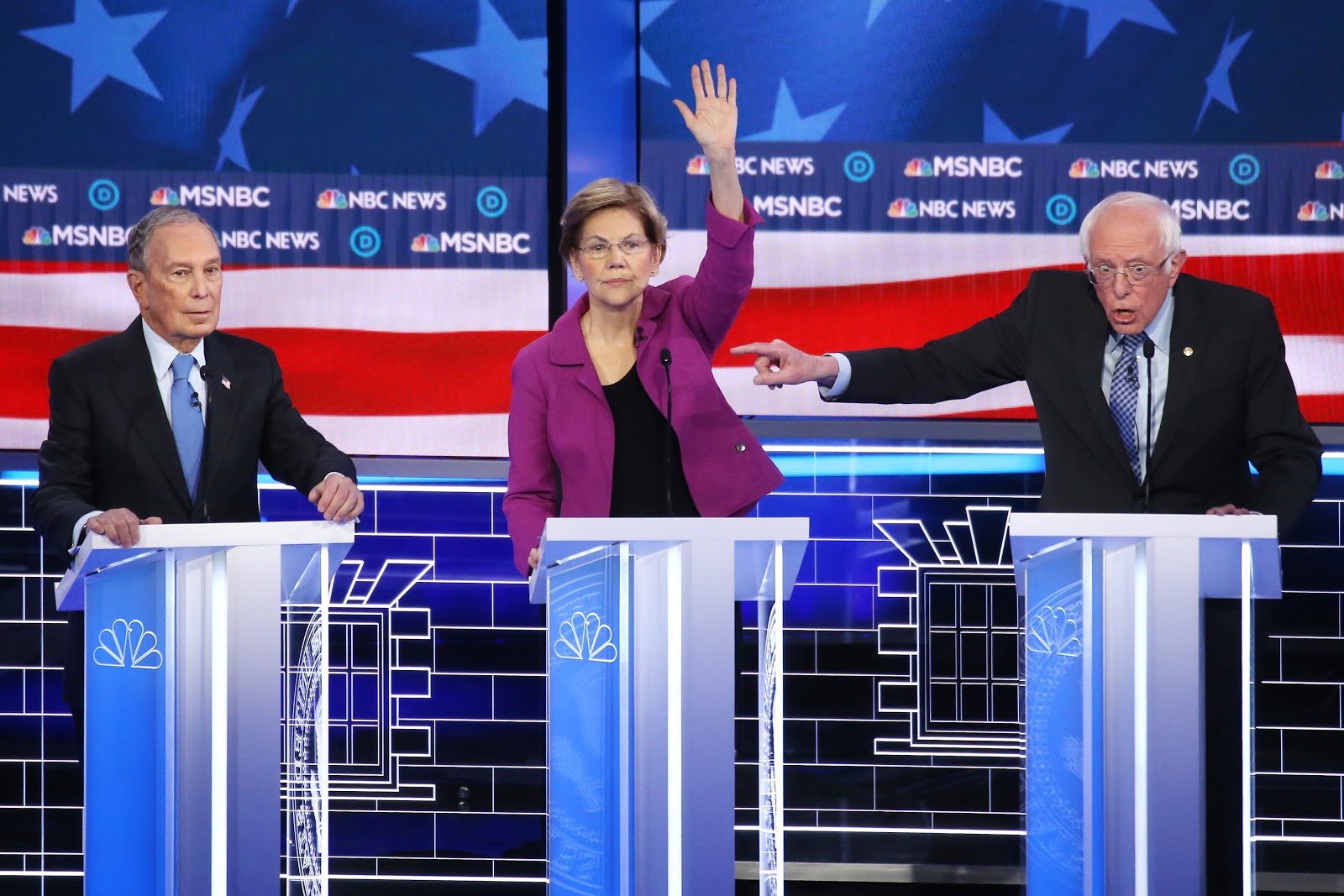The Morning Dispatch: Bloomberg Stopped, Frisked

Happy Thursday! Normally we like to come up with a quick joke here, but we are filing this newsletter very late after watching the Democratic debate last night, and we sunk what’s left of our remaining brainpower into that excellent subject line.
Quick Hits: Today’s Top Stories
President Trump named Richard Grenell, currently ambassador to Germany, as acting director of national intelligence.
Members of several other 2020 campaigns are criticizing frontrunner Bernie Sanders for not releasing more medical records after he suffered a heart attack on the campaign trail last year. The Sanders campaign protests that they have already released as many health records as any other candidate.
After a thorough internal review, The Hill found that John Solomon “failed to identify important details about key Ukrainian sources” in his columns that were used by Rudy Giuliani and others as evidence of Joe Biden’s alleged impropriety in Ukraine.
John Rood, the undersecretary of defense for policy, announced he will leave his post at the end of February after President Trump asked for his resignation. Rood told Congress last year that Ukraine had made the reforms necessary to justify sending security aid, undermining part of President Trump’s impeachment defense.
The Roman Catholic Diocese of Harrisburg, Pennsylvania, filed for bankruptcy following dozens of claims of sexual abuse.
Ryan Newman, the NASCAR driver who suffered a horrific crash at the Daytona 500 earlier this week, has been released from the hospital.
The Gloves Come Off

The Nevada Democratic debate has come and gone, and it looks like everyone’s decided it’s about time to start getting mean. Pete Buttigieg and Amy Klobuchar sniped back and forth over whether forgetting the name of a world leader is a presidential dealbreaker, or whether the real dealbreaker is being too smug onstage. Mike Bloomberg and Bernie Sanders squabbled over whether a democratic socialist should own three homes.
But most of the real venom came from Elizabeth Warren against Bloomberg, and Warren landed every hit. In short order, she savaged his record on New York’s stop-and-frisk policy, his presumptuousness in trying to buy the presidency, and—most damningly—the women who have brought charges of sexual harassment and gender discrimination against his companies.
“The mayor has to stand on his record, and what we need to know is exactly what is lurking out there,” Warren said. “He has gotten some number of women—dozens? Who knows?—to sign non-disclosure agreements both for sexual harassment and for gender discrimination in the workplace. So, Mr. Mayor, are you willing to release all these women from their non-disclosure agreements so we can hear their side of the story?”
“We have a very few non-disclosure agreements,” a stone-faced Bloomberg replied. “None of them accuse me of doing anything other than maybe they didn’t like a joke I told… They signed those agreements and will live with it.” The crowd booed.
The performance was bad enough that some onlookers predicted it was the beginning of the end for the Bloomberg campaign. But Andrew has a piece up on the site today arguing that it’s too early to count Bloomberg out on the back of one debate clunker, given that his campaign is specifically structured to try to make events like debates superfluous:
From the beginning of the primary, Democrats were determined not to repeat the same mistakes they made in 2016 by appearing to prejudge the race in favor of or to exclude any particular candidate. As such, they bent over backward to keep things inclusive throughout 2019. Nowhere was this more obvious than in the debates, where month after month the DNC fielded crowded stages of candidates, slowly tightening the qualification thresholds and doing little to eliminate candidates with only the barest whisper of support.
This strategy ensured that Democratic voters wouldn’t have choices taken away from them by the party brass. But it also helped to create the circumstances Democrats found them in late last fall: Still heavily divided, with no commanding frontrunner, and with voters feeling less spoiled by their choices than paralyzed by them. Despite the sound and fury of a year of campaigning and dozens of hours of debates, a remarkable number of voters remained undecided about who they would support. And they were increasingly tuning out from the events designed to help them pick: the 18 million who tuned into the first Democratic debate last June had dwindled to a third of that by November.
Enter the Bloomberg rope-a-dope: Skip all that mess, then swoop in and scoop up voters who were tuning out by giving them a vision of an entirely different, much simpler primary. Positively saturate them with ads making a simple case: Donald Trump is a wretched president, and Mike Bloomberg can beat him. Ignore the fact that other candidates are making the same argument. Ignore the other candidates altogether. Trust only in the fact that you can buy more ads more often and in far more places than anybody else, and hope that voters will default to you rather than face the daunting task of trying to pick a candidate on the merits.
So far, it’s an unproven strategy. But it’s hard to see how one bad debate performance sets it back much. After all, the voters Bloomberg is targeting are the ones least likely to have seen that performance at all.
The Incredible Shrinking Political Party
Pete Buttigieg said something in the debate last night that deserves some additional attention. “Let’s put forward somebody who’s actually a Democrat,” the former South Bend mayor argued in a not-so-subtle shot at two of the frontrunners for his party’s presidential nomination. “We shouldn’t have to choose between one candidate who wants to burn this party down and another candidate who wants to buy this party out.”
For the site, Declan took a look at the declining influence of political parties, and why both Democrats and Republicans have been susceptible to hostile takeovers in recent years. Read the whole thing, but you can check out this snippet below.
For most of the 20th and early-21st century, Democratic and Republican presidential nominees devoted decades of their lives to the parties, toiling away at other levels of government and biding their time. Richard Nixon was first elected as a Republican to the House of Representatives in 1946; he later spent eight years as Dwight Eisenhower’s vice president before twice receiving the Republican nomination. John McCain spent nearly 30 years in the House and Senate—not to mention his several decades in the military—before being anointed the GOP standard bearer in 2008. Even Jimmy Carter, who at the time was considered the ultimate outsider, served in Georgia state politics for years—first as a state senator, then as governor—before winning the Democratic nomination in 1976.
No longer is that kind loyalty required. Jonathan Rauch—a senior fellow at the Brookings Institution who has researched the parties extensively and written a book on the subject—helped explain why.
Rauch finds the Democratic party’s succumbing to Sanders—like the Republican party’s to Trump in 2016—a bit strange. “It’s proved difficult for the party establishment to coalesce behind a candidate, or to clear the lanes for a candidate, or to vet candidates,” he told The Dispatch. “And the result of that is this very peculiar fragmented campaign, which includes one person who’s not even a Democrat being the apparent frontrunner, that’s just bizarre.”
“The parties have lost a lot of their influence as organizations, even as partisanship and party brands have increased,” he said. “And the result of that is that you can be Donald Trump or Bernie Sanders, someone with weak or non-existent organizational ties to the party, but if you’re able to usurp the party brand—that is, use the party as a vehicle for yourself—you get all those voters because you’re running as the Republican or you’re running as the Democrat.”
Worth Your Time
Sonia Nazario’s family has escaped persecution in Poland, Syria, and Argentina. “By giving us a home, the United States saved our lives,” she writes in The New York Times. Read the full piece to get a sense of the real-world consequences of the Trump administration cutting the maximum allowable number of refugees per year from 110,000 to 18,000.
The Atlantic’s Edward-Isaac Dovere published a remarkable piece of reporting claiming that Bernie Sanders came within a hair’s breadth of running against Barack Obama in 2012, and that it required the personal intervention of then-Senate Majority Leader Harry Reid to talk him out of it. A spokesman for Sanders has since denied some of the details, but Obama and Reid officials have not. The piece offers a fascinating look at the fraught relations between the renegade left wing and the liberals of the Democratic Party, which burst into the open in the 2016 election but were simmering out of sight well before. Read it here.
Each of us can only hope for a career peak so high that we can glide off of it for decades to come. For The Ringer, Winston Cook-Wilson details the legacy of Harrison Ford. “Sure, he’s Han Solo, Indiana Jones, and Rick Deckard, but in the 21st century, he’s also unmatched in his ability to care as little as humanly possible.”
Presented Without Comment
Also Presented Without Comment
Okay, a quick comment: Boneless “wings” aren’t “wings,” even in the broad definition that includes mini-drummies. Boneless wings are chicken tenders.
Really Presented Without Comment
See also: “How Bill O’Reilly Silenced His Accusers”
Something Fun
There’s a chance we’ll find out in a few days that this was planned ahead of time, but until then, enjoy the incredible spontaneity of this moment.
Toeing the Company Line
Wednesday’s Dispatch Podcast featured Sarah, Steve, Jonah, and David diving into President Trump’s recent clemency spree and previewing the upcoming Nevada caucuses. Be sure to download, rate, and subscribe here!
In Thomas Joscelyn’s latest Vital Interests newsletter, he covers recent developments in the “original 9/11 conflict,” asking, “are we headed toward an ignoble end in Afghanistan?” Read the whole thing here.
What’s that? A Wednesday G-File? You don’t say! In this midweek edition, Jonah takes a look at Oren Cass’ new political organization, American Compass, that is hoping to combat “libertarian fundamentalism” within the GOP. “Their task will be more difficult if they actually believe what they say and act as if they are battling a capitalism that sits on a throne rather than one that stands quite fettered,” Jonah argues. Give it a read here.
Let Us Know
Which rivalry within the Democratic presidential primary is most likely to break out into a shoving match in the next debate?
Elizabeth Warren vs. Mike Bloomberg
Bernie Sanders vs. anyone in the audience with more than $40 in their wallet
Amy Klobuchar vs. Pete Buttigieg
Mike Bloomberg vs. everything he’s said and/or done in the past
Tulsi Gabbard vs. Hillary Clinton
Tom Steyer vs. fashion
Reporting by Declan Garvey (@declanpgarvey), Andrew Egger (@EggerDC), Sarah Isgur (@whignewtons), and Steve Hayes (@stephenfhayes).
Photograph by Mario Tama/Getty Images.